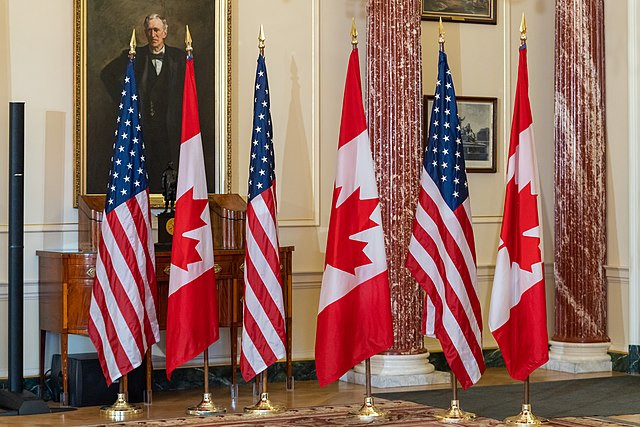President Donald Trump sharply escalated the trade conflict with Canada on Tuesday, announcing the doubling of tariffs on Canadian steel and aluminum imports from 25% to 50% in retaliation for Ontario's decision to impose tariffs on electricity exports to the United States. Trump's dramatic move triggered a market reversal and prompted fresh fears of economic instability.
In a statement posted to Truth Social, Trump directed his administration to implement the increased tariffs effective Wednesday, March 12. "Based on Ontario, Canada, placing a 25% Tariff on 'Electricity' coming into the United States, I have instructed my Secretary of Commerce to ad [sic] an ADDITIONAL 25% Tariff, to 50%, on all STEEL and ALUMINUM COMING INTO THE UNITED STATES FROM CANADA, ONE OF THE HIGHEST TARIFFING NATIONS ANYWHERE IN THE WORLD," Trump wrote.
Trump went further, reiterating his provocative demand that Canada consider joining the United States as the 51st state, suggesting this as the only comprehensive solution to eliminate tariffs. "The only thing that makes sense is for Canada to become our cherished Fifty First State. This would make all Tariffs, and everything else, totally disappear," Trump said.
The new tariff announcement swiftly rattled financial markets. After attempting an early recovery from Monday's losses, the S&P 500 fell 0.6% by midday Tuesday following Trump's announcement. The Dow Jones Industrial Average also dropped by 1.2%, continuing Wall Street's sell-off triggered by growing anxiety over the president's unpredictable trade strategy.
The tariff hike reflects an escalation following Ontario's recent imposition of a 25% surcharge on electricity exports to several U.S. states, prompting Trump's strong reaction. He further threatened Ontario officials with additional economic penalties, promising a response "so big that it will be read about in History Books for many years to come."
Ontario Premier Doug Ford quickly responded to Trump's aggressive moves, emphasizing that Canada "will not back down," even suggesting that the province could retaliate by fully cutting off electricity supplies to the United States if necessary. In comments to MSNBC, Ford urged American business leaders to confront Trump directly. "We need those CEOs to actually get a backbone and stand in front of him and tell him, 'This is going to be a disaster. It's mass chaos right now,'" Ford said.
Canada supplies the largest share of U.S. electricity imports, according to data from the U.S. Energy Information Administration, though such imports account for less than 1% of total U.S. electricity consumption.
This renewed conflict between two traditionally allied nations compounds existing economic concerns amid Trump's volatile trade policies. Recent weeks have seen a notable downturn in both consumer and business confidence since Trump entered office.
A recent survey in Chief Executive magazine revealed CEO ratings of the business climate fell sharply by 20% in January, dropping from 6.3 out of 10 to just 5-the lowest point since spring 2020. Additionally, the Conference Board reported consumer confidence dropped more than 6% in February, marking the largest monthly decline since August 2021.
These indicators reflect growing apprehension over the potential economic repercussions of Trump's escalating trade tactics, specifically fears of a possible recession. Following Trump's weekend comments to Fox News, in which he refused to rule out an economic downturn, the Nasdaq experienced its worst single-day decline since September 2022, plummeting 4%.






